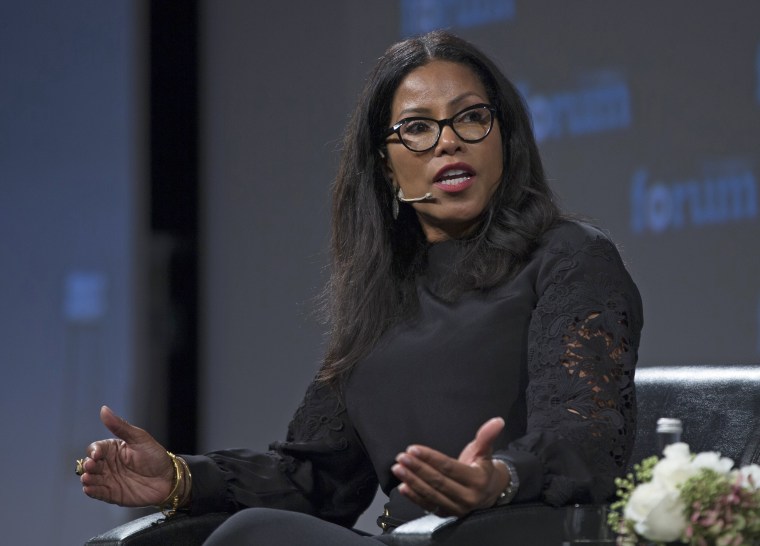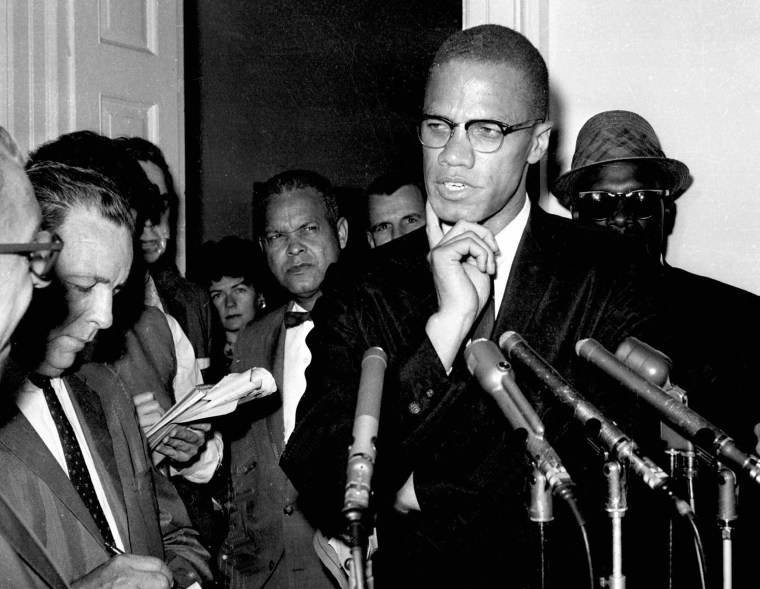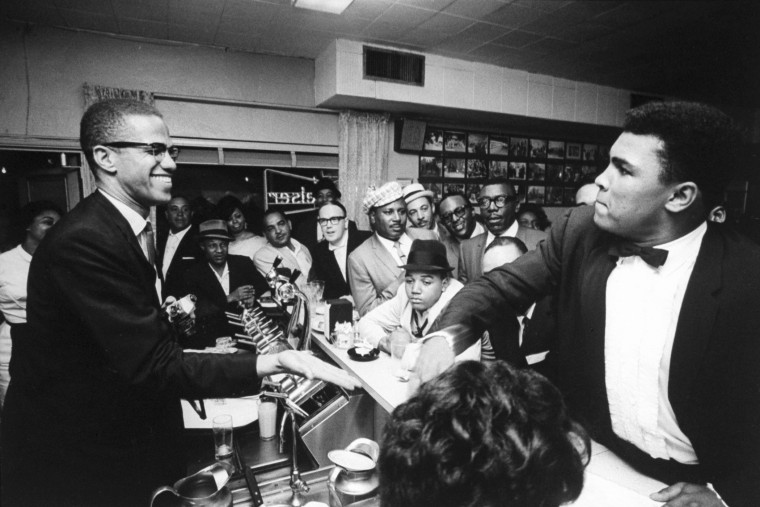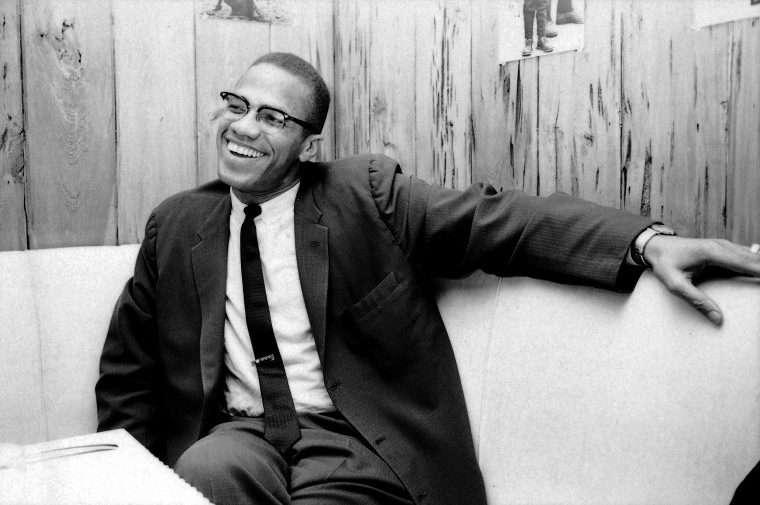Ilyasah Shabazz is used to hearing from people from all walks of life about how much “The Autobiography Of Malcolm X” influenced them.
“His life resonates with so many people who find themselves at a crossroads, especially young people in underserved communities,” Shabazz, the third daughter of Malcolm X and Betty Shabazz, told NBC News. “When you have people who are weary — whether they are young or they are old — with the way that our system works, they seemed to find a lot of solace in it.”
Since it was published in 1965, “The Autobiography of Malcolm X” has sold millions of copies around the world and served as a guidebook into the life and philosophy of a civil rights leader who was as contentious as he was revered. Released eight months after his assassination and based on more than 50 interviews with the writer Alex Haley, the book was integral to shaping Malcolm X’s legacy.
“The Autobiography of Malcolm X” will soon reach a new audience on Thursday, when Audible releases an unabridged audio version of the text for the first time. Performed by the Oscar-nominated actor Laurence Fishburne, Shabazz said she hopes the audiobook “will inspire today’s activists and create a shared understanding with the civil rights leaders of the 1960s.”
A convert to Islam in his 20s, Malcolm X forged a relationship with the Nation of Islam through the 1950s, and he became a leading public voice of the controversial group. His speeches and writings focusing on Black empowerment and the need for Black independence were largely considered more radical than that of the nonviolent approach of the civil rights movement. Malcolm X eventually left the Nation of Islam and converted to Sunni Islam in 1964 after performing the Hajj that same year. Still, his uncompromising rhetoric led to deep suspicions within white America, which could be summed up by a New York Times editorial in 1964 describing him as an “embittered racist” and an “irresponsible demagogue.”
This distrust persisted after his death. Immediately following his assassination at 39 in February 1965, “there was widespread derision in terms of Malcolm and his life” in the mainstream, white-owned press, noted Zaheer Ali, a historian and senior fellow at the Pillars Fund, a Muslim American philanthropic organization. An example of this is another New York Times editorial that ran the day after he was killed that described Malcolm X as “an extraordinary and twisted man” who used his “many true gifts to evil purpose.”
In contrast to those narratives, reading his extensive autobiography allowed readers to explore Malcolm X’s life story on their own terms, Ali said.
Partly as a result, the overall public mood toward Malcolm X began shifting after the book’s release, which had sold more than 6 million copies by 1977, the year Haley died. “The book invites a full assessment of Malcolm’s life, it offers a reassessment of what people thought of him,” Ali said, adding that the book’s publication also came “at a time where the civil rights movement itself was being transformed” with the passing of the 1964 Civil Rights Act and the Voting Rights Act in 1965.
“The book became almost the sacred text of the Black Power movement,” Ali said. “It was almost like the bible, if you will, for many people, especially many young people, who were moving into the Black Power phase of the Black freedom movement.”
Shabazz herself was one of the young Black Americans who first read her father’s autobiography as a teen.

Malcolm X’s strong denunciation of white supremacy and his moving telling of how he went from being a troubled youth in the foster care system to become one of the most influential civil rights leaders of the 20th century is one reason the autobiography endures 55 years after its publication, with several activists, lawmakers and advocates crediting it with being instrumental in their decision to fight for civil rights.
Rep. André D. Carson, D-Ind., said a white teacher gave him the autobiography when he was a high school student in the early 1990s. “Malcolm was unapologetic in his boldness and he was unapologetic in speaking truth to power. He wasn’t fearful and he wasn’t trying to cater to a specific demographic,” Carson, one of four Muslim Americans in the House of Representatives, told NBC News. “He spoke from the heart, he spoke his truth and I think that resonates with people.”
The audiobook’s release comes as many Americans have been reading or returning to the autobiography in recent months as protesters confront police violence and systemic racism.
“We have never really dealt with race in our country. It has been this thing where white people have just expected Black people to forget and move on — even in the face of injustice,” said author Kim Johnson, whose new young adult novel “This Is My America” centers on a teen who is determined to get her innocent father off of death row. Johnson credits her study of Malcolm X and other civil rights leaders from the 1960s as an instrumental influence on her book.
“I think about what is happening right now in our society and it’s the same issues Malcolm X was fighting for and questioning,” Johnson said. “He himself was questioned by police. He was in the school-to-prison pipeline. He was talking about the same issues. They are just slightly different.”

Author and publisher Wade Hudson recalled being blown away by Malcolm X’s speeches and writings as a teenager, especially when he connected the struggles of Black Americans to other oppressed people worldwide.
“His voice particularly resonated with those of us who were younger at that time because so many older people around us were really afraid to speak out because of the retribution from the racist Jim Crow system,” Hudson said. With his wife, Cheryl Willis Hudson, he has worked on several books about the Black American experience, most recently the anthology, “The Talk.”
Malcolm X’s messages were particularly startling for young people who grew up in families like Cheryl Willis Hudson’s. “At the time he was really a radical,” said Willis Hudson, who grew up in Virginia while schools were just beginning to desegregate. “The autobiography just had a tremendous impact on how we could voice our concerns out loud.”
To many Black Muslim Americans, Malcolm X’s story also is intrinsically linked to his faith. Safiyah Cheatam, 24, an artist, remembers thinking of Malcolm X as a “household name” in her New Jersey home growing up.
Malcolm X’s faith journey is personally important to Cheatam because she says Black American Muslim stories are rarely part of the conversation about Islam in American. “I think his way of being a Muslim shines a light onto how you can be Black, and how you can be influential, and how you can be Muslim,” she said.

Margari Hill, the executive director of the Muslim Anti-Racism Collaborative, recalls reading Malcolm X’s FBI files after graduating from high school in the early 1990s shortly before she converted to Islam. She said she came of age during a time when Malcolm X’s words were everywhere in popular culture, thanks to both the Oscar-nominated performance by Denzel Washington in the 1992 “Malcolm X” biopic, and hip-hop artists like Gangstarr, Eric B and Rakim.
Malcolm X’s story was also relatable in a way that the lives of many prominent Black Americans were not for those who had experienced incarceration and homelessness. “He exemplified a way of being dignified without having to go through respectability politics,” Hill said. “He showed you could still build and create a life for yourself.”
Ultimately, Hill said, “The Autobiography of Malcolm X” still resonates with readers because it is a story of self-discovery and self-determination. “It’s not just a historical book, it’s a hero’s journey of struggling with white supremacy,” she said. “While it ended in tragedy with his assassination it also showed his power. Why were people so afraid of him? What were they trying to uphold?”
